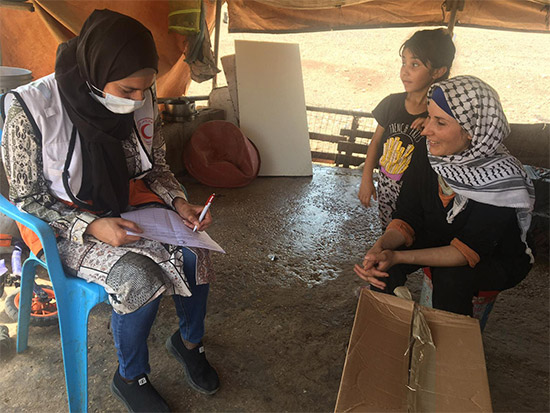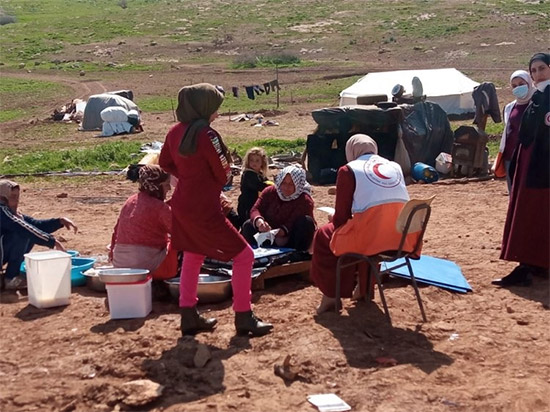 30 April 2021 - Humsa is a collection of Bedouin communities comprising around 175 people, in the north Jordan Valley in the West Bank.
30 April 2021 - Humsa is a collection of Bedouin communities comprising around 175 people, in the north Jordan Valley in the West Bank.
Two major incidents of demolitions by Israeli forces at Humsa Al Bqai’a occurred in February 2021, where 60 people including 35 children were left displaced and at risk of forcible transfer. The community was provided tents, kitchen utensils and other essential support by humanitarian agencies. The Palestine Red Crescent Society (PRCS) outreach team was approached by the community after the demolitions took place and has since been visiting the community to provide primary health care and women health services, along with medicines, hygiene kits, food parcels and tents to individuals and families. The mobile clinic team comprises a doctor, nurse, social worker, and driver.
The communities of Humsa are remote and in areas designated as firing zones by Israeli forces. Road access is difficult, made more hazardous by the wet conditions during the early visits in winter. There are several kilometres between each community. The nearest permanent primary health facility is some 12 to 20 km away (depending on the community), with no public transport and few cars available to make the journey.
Afaf is the social worker with the clinic. She commented, “People in this area, especially women, face a lot of pressure and difficulties. Their basic needs are not being met. Women have to cross over hills to bring the water they need.” Afaf provides health promotion and awareness services for the women, focused on areas such as nutrition in pregnancy and child health. “Although we strive to provide health services and support, the difficulties with access for the communities and the severe restrictions on development of infrastructure for basic necessities like water, housing and electricity affect the health of the communities badly. Some families have been divided so that the children can attend schools, which are closer for some communities than others.”
difficulties. Their basic needs are not being met. Women have to cross over hills to bring the water they need.” Afaf provides health promotion and awareness services for the women, focused on areas such as nutrition in pregnancy and child health. “Although we strive to provide health services and support, the difficulties with access for the communities and the severe restrictions on development of infrastructure for basic necessities like water, housing and electricity affect the health of the communities badly. Some families have been divided so that the children can attend schools, which are closer for some communities than others.”
Humsa Al Bqai’a has been subject to four mass demolitions/confiscations since 2014, affecting homes as well as structures for water, hygiene, sanitation, and agriculture. Demolitions and restricted planning in Area C of the West Bank impact on community health by affecting access to affordable clean water, and in turn livelihoods, poverty, and food security. Rural Palestinian communities in the Jordan Valley experience higher rates of stunting and childhood malnutrition. Community mental health meanwhile is affected by the situation of precarity that arise from insecurity of housing and exposure to high levels of violence.








